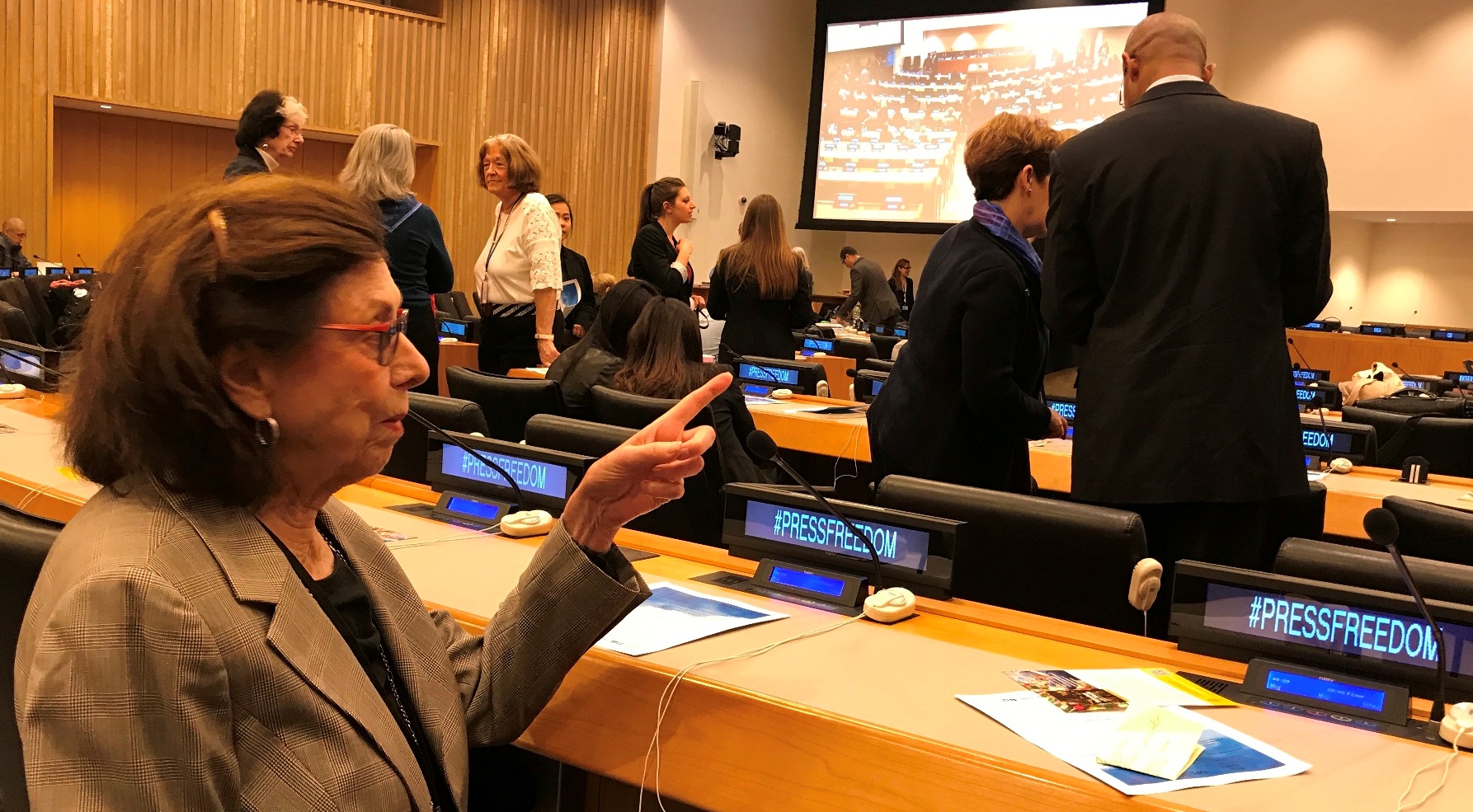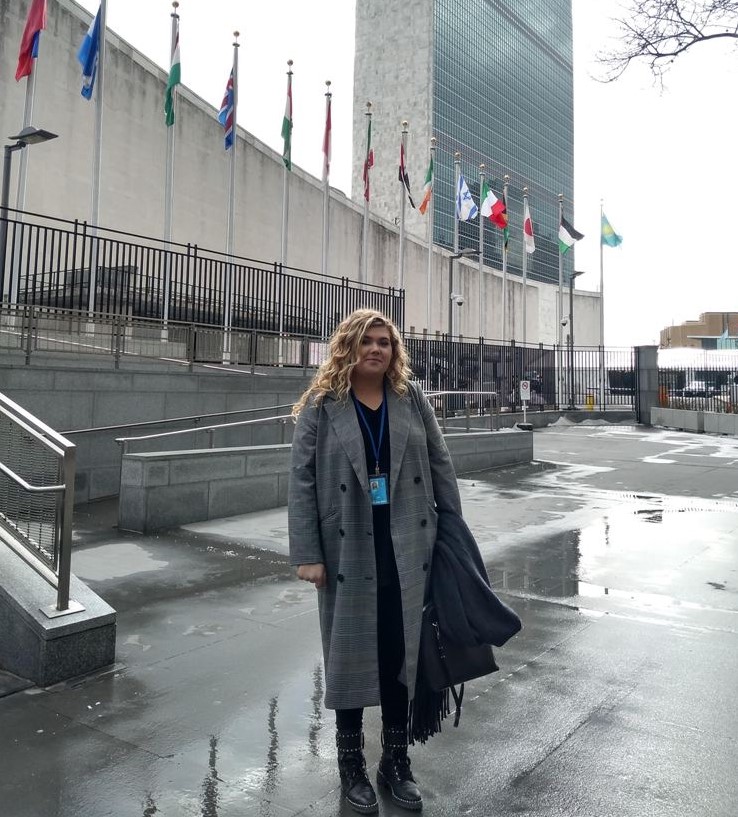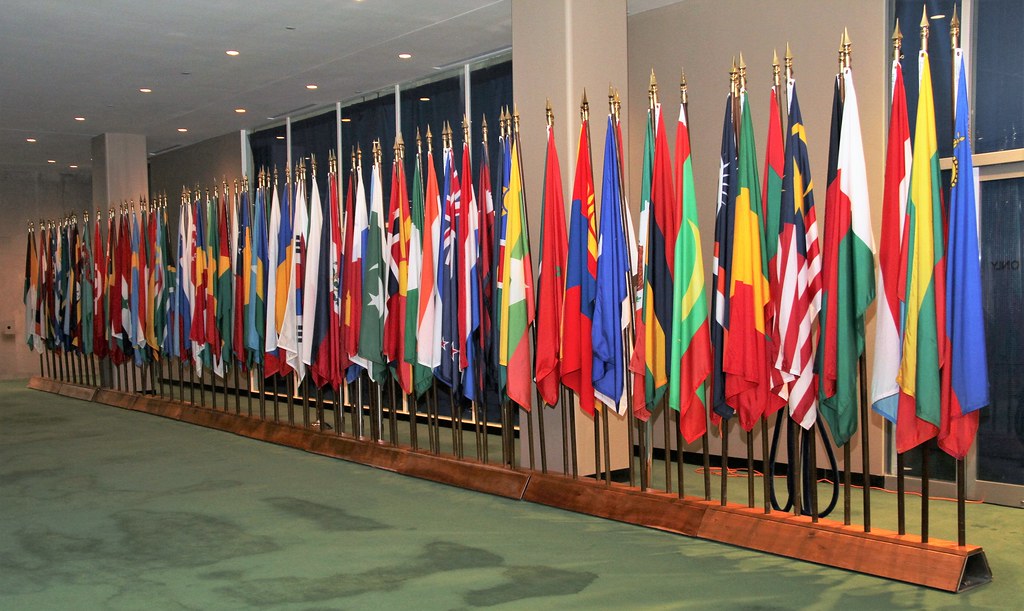
IPRA and the UN
IPRA has a long history of association and consultation with certain organs and agencies of the United Nations
- Since 1984 IPRA has been an NGO associated with the New York based UN Department of Public Information now known as the UN Department of Global Communications. Communicating in more than 80 languages, the Department tells the UN story across multiple platforms “to build support for the aims and work of the United Nations".
- Since 1984 IPRA has consultative status with the New York based Economic and Social Council (ECOSOC).
- Since 1983 IPRA has consultative status with the Paris based UN Educational, Scientific and Cultural Organisation (UNESCO).
- Since 2002 IPRA has been an accredited organisation to the UN Environment Programme (UNEP) based in Nairobi, Kenya.
- IPRA also engages with The Conference of Non-Governmental Organizations in Consultative Relationship with the United Nations.
UN New York Update
UN representatives Jim McQueeny and Matthew Cossel. Youth Representatives Diya Narayan, Annabel Prunty, Connie Herrera.
To learn more about IPRA's partnership with the UN please contact this address
IPRA discusses AI risks with the Journalists and Writers Foundation
The IPRA UN Bureau recently attended a Journalists and Writers Foundation event titled “Empowering Children’s Rights: Youth voices on shaping a sustainable and inclusive future.” The event discussed the risks posed by AI for children, including data misuse, privacy violations, and exposure to violent content.
Security and AI
IPRA attended "From Intelligence to Agency: AI’s new frontier in international security," an event organised by the UN Institute for Disarmament Research addressing the risks and opportunities of incorporating agency Artificial Intelligence into professional and security settings. It was an opportunity to discuss the IPRA AI guidelines.
UN Global Dialogue on AI
On the 25 September 2025 launch of the UN Global Dialogue on Artificial Intelligence Governance, IPRA reaffirmed its commitment to ethical AI and reminded the Dialogue about the 2025 AI Gold Paper.
IPRA speaks out on misuse of law
IPRA’s NGO liaison to the UN was a key speaker at a global workshop on SLAPP lawsuits which are an increasing threat to media freedoms, human rights and public relations. Board member Jim McQueeny invoked studies from the UN’s Office of the High Commission that said “such lawsuits are growingly used in all parts of the world, irrespective of legal traditions and judicial systems, either by state or non state actors.” SLAPP stands for Strategic Lawsuits Against Participation and are usually deployed by powerful interests to tie up or financially hobble activists from journalists to academics and human rights defenders.
Football for the Goals
Youth Representative Connie Herrera recently attended a launch event for the initiative Football for the Goals (FFTG) in support of World Football Day. The initiative urges the global football community to harness its influence to advocate for the Sustainable Development Goals. FFTG partners with media and commercial sponsors to utilize players as spokespersons, host tournaments, and organize fundraising events.
World Press Freedom Day 3 May 2025
Annabel Prunty attended a side event to commemorate World Press Freedom Day, focusing on the theme set by UNESCO: "Reporting in the brave new world, the impact of artificial intelligence on press, and freedom of the media." The panel highlighted the global and interconnected nature of threats to press freedom.
IPRA advises ECOSOC on social media and AI
IPRA has submitted its statement for the annual ECOSOC HLS meeting which has the topic: “Advancing sustainable, inclusive, science- and evidence-based solutions for the 2030 Agenda for Sustainable Development.” The statement entitled “The importance of trusted communication channels to achieve the Sustainable Development Goals” warns that the UN will fail to achieve the goals unless member states restore trust in communication with law mandating paid-for social media, and introducing regulation of Artificial Intelligence. The Statement has been accepted by ECOSOC.
ECOSOC Youth Forum
In mid-April 2025 IPRA’s youth representative Connie Herrera attended an ECOSOC Youth Forum side event “Youth voices driving innovation for quality education, social inclusion, and sustainable development.” The event organized by the Journalists and Writers Foundation focused on five of the sustainable development goals. A key conclusion was that “where you live should not determine if you live.”
UN–related event on gender bias
IPRA organised a panel discussion to support the meeting of the UN’s NGO Committee on the Status of Women. On 19 March 2025 Diya Narayan helped organise the discussion in New York which included IPRA president Nataša Pavlović Bujas and assistant professor Minjung Noh, from the Department of Religion, Culture, and Society at Lehigh University, Pennsylvania, USA.
New youth representative
IPRA has appointed Connie Herrera as its newest Youth Representative to the United Nations. In this role, she will help relay crucial news and information from the UN to IPRA members, with a focus on the UN’s Sustainable Development Goals. Herrera is a graduate student from Sacred Heart University.
ECOSOC and Social Development
In February 2025 IPRA held meetings across the United Nations system. James McQueeny, Matthew Cossel and Annabel Prunty attended the 2025 ECOSOC Partnership on 5 February, Cossel attended the sixth plenary session of the Commission for Social Development 63rd Session (CSocD63) and the DGC Civil Society briefing with the president of the General Assembly on 12 February, and McQueeny and Prunty attended the CSocD63 side event titled Strengthening local journalism, rebuilding social inclusion, and participatory governance on 12 February.
Invitation to IPRA members to influence UN social policy
IPRA’s UN bureau offers an opportunity for members to take an active role in UN policy development. IPRA members may join both a preparatory meeting (the partnership forum) and the 63rd annual session of the Commission for Social Development which takes place at UN Headquarters in New York from 10 – 14 February 2025. As an accredited NGO, IPRA can send representatives to these events organised by the UN’s Department of Economic and Social Affairs.
Commission on the Status of Women
The 69th session of the Commission on the Status of Women (CSW) takes place from 10 – 21 March 2025 in New York. The CSW is the UN’s global intergovernmental body dedicated to the promotion of gender equality and the empowerment of women. IPRA Youth Representative Diya Narayan attended a briefing on the March meeting facilitated by Lopa Banerjee, chief of the Civil Society Section at UN Women. The 69th CSW will focus on the 30th anniversary of the Beijing declaration and on celebrating diversity, advancing human rights, and the importance of leaving no one behind.
AI: a key part of Pact for the Future at UN Summit
IPRA representatives James McQueeny and Matthew Cossel attended the UN Summit of the Future, a global convening of intergovernmental organizations to create an action-oriented Pact for the Future. The Pact was ratified by the UN Member States on 22 September 2024 and is linked here together with its UN Resolution here. The Pact is the culmination of a lengthy process to adapt international cooperation to the realities of today and the challenges of tomorrow. The Pact’s five focus areas are: sustainable development; international peace and security; science and technology; youth and future generations; and transforming global governance. A section called the Global Digital Compact marks the first worldwide agreement on the regulation of artificial intelligence, much in line with IPRA’s own AI Guidelines for the ethical use of artificial intelligence in communications.
Safeguarding children
IPRA’s UN cohort attended Unlearning intolerance: global citizenship education and SDG16. UN sustainable development goal 16 is all about peace, justice and strong institutions. This 20th anniversary event was held as a part of the ECOSOC’s High-Level Political Forum and hosted by the permanent missions of Costa Rica and Korea. The meeting focused on the learning rights of children and examined threats to accessible education such as violence.
On July 30 to mark World Day Against Trafficking in Persons, IPRA attended a virtual UN agency meeting on child trafficking. Joyjit Deb Roy, chief global programs officer, of host development NGO Winrock informed that "children are two times more likely to face violence than adults”. Participants also heard that “children do not realize the complexity of their situation”, and that “child trafficking tends to mix with other crimes such as drugs” A modern issue is that access to the internet exposes children to the traffickers.
Social development
On 10 July 2024 IPRA attended a side event under the auspices of ECOSOC’s High-Level Political Forum entitled Social Development Amidst Converging Crises following its commentary regarding actions on climate change and artificial intelligence. The symposium, hosted by the permanent mission of Samoa, focused on sharing productive solutions and stakeholders’ analysis with an objective to build resilience against shocks and crises. Speakers urged countries to conduct multi-dimensional poverty indices to increase awareness to nation-specific crises such as natural disasters and the local effects of climate change. Solutions to reduce CO2 emissions included re-forestation and the analysis of geographical data from vulnerable areas from multiple sources and technologies.
IPRA supports UN goals for multilingualism and ending child labour
IPRA’s representatives attended meetings with the International Labour Organization (ILO), and the Study Group on Language and the United Nations. The Study Group is an initiative under the UN Strategic Framework on Multilingualism which launched on 27 March 2024. IPRA reaffirmed its commitment to human rights, ethical communication and the UN’s sustainable development goals. A symposium hosted by The Study Group focused on Language rights for peace, justice, and strong institutions. Presentations emphasised that language rights are a powerful mechanism to promote peace and strengthen communities. June 12 marks the World Day Against Child Labour. An event marking the occasion discussed the challenges faced in the elimination of child labour. Gilbert Houngbo, director general of the ILO was proud to announce that, “2024 marks the 25th anniversary of the adoption of ILO Convention No. 182 on the worst forms of child labour.” All speakers underlined their commitment to eliminate child labour wherever it happens.
The United Nations is reiterating its commitment to Africa
That effort is personified by the Department of Global Communications’ Civil Society Conference being held In Nairobi, Kenya, on 9 May. IPRA’s UN representative Jim McQueeny and youth rep Alexa Moyer participated in a UN town hall meeting to discuss planning and content. Workshops will focus on better governance, diversity and climate. Attendance is expected to be over 4000 people from 3083 organizations in Africa and beyond.
IPRA advises ECOSOC on AI communication guidelines
In its annual submission to the UN Economic and Social Council (ECOSOC) high level segment, IPRA recommends the adoption of an amended set of AI communication guidelines. These guidelines are based on the IPRA guidelines for PR practitioners adopted in 2023. In the statement IPRA informed ECOSOC of recent activities in pursuit of UN goals including the GWA Global Contribution Award, our Thought Leadership essays and webinars, and the climate change communication guidelines. The ECOSOC HLS will be held from 15 to 18 July 2024, on the theme “Reinforcing the 2030 Agenda and eradicating poverty in times of multiple crises: the effective delivery of sustainable, resilient and innovative solutions.”
UN and women of African descent in the struggle for climate justice
In March 2024, IPRA Youth Rep Diya Narayan participated in the event Economic Empowerment of Women of African Descent in the Struggle for Climate Justice at UN headquarters New York. The conference addressed the lack of women in Africa in the discussion of Climate Justice. Speakers included Djibril Diallo, president of the African Renaissance Diaspora Network and Dr. Natalia Kanem from the UN Population Fund. During questions Professor Thierno Thiam, provost at Johnson C. Smith University USA, observed that: “Climate change is settled by science, however it is an issue unsettled in politics”.
New youth representative
IPRA has named Annabel Prunty as their latest Youth Representative to the United Nations to help communicate important news and information from the UN to IPRA members and the PR community internationally. Prunty’s joining of IPRA’s UN delegation further cements the organization’s commitment to youth empowerment and discussing youth issues during the UN’s working calendar. Prunty studies at the College of Arts and Sciences at New York University.
IPRA invited to 69th UN civil society conference
IPRA has been invited to attend the 69th UN Civil Society Conference being held 9-10 May in Nairobi, Kenya. The event, under the theme Shaping a Future of Global and Sustainable Progress, is a venue for civil society to participate in the preparations for the Pact for the Future negotiations.
UN communications officer at the forefront of fight against misinformation
At a meeting in March in New York with IPRA UN youth representative Diya Narayan, Felipe Quiepo Rego, communications officer at the UN’s Department of Global Communications, discussed the role of the Verified programme in the fight against misinformation. He said that this was especially valuable during the pandemic. Diya attended as part of a delegation from Lehigh University, USA. She also met with Yuchan Oh, First Secretary with the mission of South Korea to the UN. Oh, who works on Security Council issues, discussed the continued importance of the UN structures to his country.
Cultural understanding and the UN
Full story is here
The increasing global role of religions
IPRA recently attended the UN event The Role of Religion and Faith-Based Organizations in International Affairs. We were represented by James McQueeny and Alexa Moyer. Under the theme of human rights, the event explored human dignity, gender equality, and learnings for an inclusive future. Alice Wairimu Nderitu, UN under-secretary general and special adviser on the prevention of genocide, stated, “We do know we can never work alone”. One of the events conclusions was that religious organizations and the UN can accomplish victories together that would be impossible otherwise.
New UN representation
IPRA is proud to announce updates to its representatives to the United Nations in New York. Matthew Cossel has been promoted to Permanent Representative to the UN from his position as a Youth Representative and both Alexa Moyer and Diya Narayan have been announced as the newest UN Youth Representatives, filling a role held by Cossel for five years. James McQueeny remains IPRA’s Head Permanent Representative to the UN and board member.
IPRA advises on UN draft social media disinformation code
IPRA has been invited by the UN DGC to provide input to the proposed UN Code of Conduct for information integrity. The draft Code is being discussed at a consultation in January and is based on a set of nine principles including integrity, human rights and transparency. IPRA leveraged its expertise in codes of conduct to provide concise edits to the proposed UN code. The Code seeks to address disinformation, misinformation and hate speech on social media and other digital platforms.
2024 UN DGC accreditation approved
The International Public Relations Association received notification from the UN’s Department of Global Communications Civil Society Office that the organization’s accreditation with the body has been approved for another year stretching through 2024.
IPRA has been an NGO associated with the New York-based UN Department of Public Information now known as the UN Department of Global Communications since 1984. Communicating in more than 80 languages, the Department tells the UN story across multiple platforms “to build support for the aims and work of the United Nations."
This is in addition to IPRA’s other accreditations with the UN’s Economic and Social Council (ECOSOC), UN Educational, Scientific and Cultural Organisation (UNESCO) and UN Environment Programme (UNEP) based in Nairobi, Kenya.
Advising the UN DGC and CoNGO
In October 2023 IPRA co-sponsored the 75th anniversary of the Conference of Non-Governmental Organizations in Consultative Relationship with the UN (CoNGO) entitled UN-NGO Relations: enhancing multilateralism, protecting NGO access, civic space and democratic discourse. The event was a celebration of work to improve NGO access to the UN Economic and Social Council and other UN bodies. Also discussed by the NGOs present was what is working, what needs to be improved, and how participating NGOs can mutually cooperate. Attending from the UN was a representative from the Executive Office of the Secretary-General, the director of the UN DGC Outreach Division, and the executive director of the UN Institute for Training and Research. IPRA’s objective was to increase awareness about our activities with other NGOs to lay the foundation for further engagement in 2024. More information is here.
Also in October, Matthew Cossel attended a UN Department of Global Communications workshop entitled Digital communications and its impact on peace, security and human rights. The event included a presentation from Mita Hosali, deputy director of the UN News and Media Division, launching a new UN News App as well as reminding NGOs about the rules for republishing UN content. The event also included a panel discussion focusing on the key role of communications in these times of increased violence and hate around the globe. More information is here.
IPRA contributes to the sustainability forum 2023
IPRA’s submission on Climate Change Guidelines has been accepted for the United Nations high-level political forum on sustainable development, held under the auspices of the Economic and Social Council. IPRA proposed that the UN consider the IPRA Climate Change Guidelines in a modified form suitable for adoption by all communicators. The modified guidelines are:
All those who wish to communicate on climate change should:
- act with honesty and integrity by
- ensuring honesty in climate-related communications
- translating the science into communication that can be understood in the public arena
- establish the moral conditions for dialogue by
- fostering an internal culture in which all parties feel safe to voice concerns
- promoting climate education in the public arena
- be open and transparent by
- reporting on their own organization’s emissions and reductions pathway
- avoid misunderstandings by
- ensuring that work is in line with the UN’s sustainable development goals
- advising management about societal expectations
- ensure truth and accuracy by
- encouraging reference to science-based sources in line with the Intergovernmental Panel on Climate Change
- calling-out inaccurate communication in the public arena
- not disseminate misleading information by
- preventing greenwashing in communication by referencing science-based data.
Read the full IPRA submission here.
The theme for the UN event, held from 10 – 19 July 2023, was “Accelerating the recovery from Covid-19 and the full implementation of the 2030 Agenda for Sustainable Development”. IPRA’s submission was intended to make this implementation practical.
UN’s fake news initiative resonates with IPRA proposal
IPRA reported below its opinion that fake news is a main and under-recognized challenge that inhibits achieving the UN goals. This was a key finding of a global member outreach conducted by IPRA as its contribution to the UN75 dialogue. We called on the UN Secretary General to declare an annual day to bring worldwide attention to the issue. And the UN is doing just that.
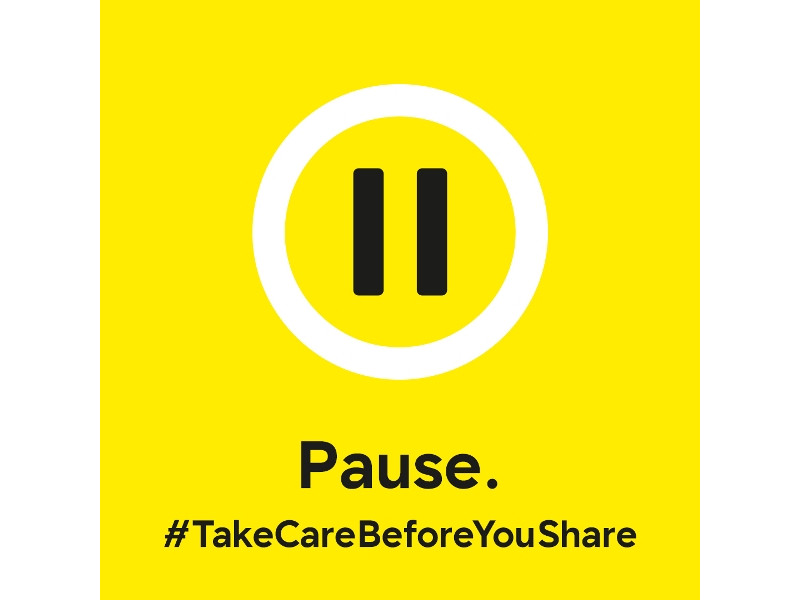
The UN is keen to encourage people to pause before they share any information because it may be misinformation. The UN Share Verified initiative fights fake news and the next step in this initiative is Pledge to Pause. This seeks to change behaviour by creating a new norm for the way people share information online.
Now, more than ever, we need to think carefully about news and information that we share. Where has it come from? Is it fact-checked? Indeed does it comply with article 7 of the IPRA Code which covers accuracy? False and inaccurate information spreads from person-to-person. It hijacks our emotions, taps into our weaknesses, tricks us into contributing to a chain of events that can harm us all. The UN is calling on us all to break the chain of lies.
On 21 October 2020, the UN asked the world to Pledge to Pause before sharing information online. IPRA fully supports this as it resonates with our suggestion of a Verified Information Day. IPRA has urged all its members to take this pledge and to share the pledge with their local networks.
The UN has created a resources link to help spread the Pledge to Pause.
As the UN turns 75, IPRA urges a global fight on fake news
Fake news is a main and under-recognized challenge that inhibits achieving the UN goals. This was a key finding of a global member outreach conducted in July by IPRA, the International Public Relations Association, as its contribution to the UN75 dialogue.

The decline of traditional journalism with editorial oversight, combined with the rise of social media, has changed how the world sends and receives information. Now opinion is portrayed as fact, propaganda is mistaken for democratic decision. Lies go untested. One result is a proliferation of fake science. Moreover, the emergence of new types of social media are being overwhelmed by fake stories.
Reset the date of the SDGs
IPRA also felt that two long-term problems are critical to the survival of humanity: the rise in average global temperatures causing a scarcity of potable water and the digital divide between developed and underdeveloped countries. Without a solution to these problems, people will be worse off in 2045. IPRA encouraged the UN to reset the date for completing its Sustainable Development Goals from 2030 to 2045, with a priority on SDG13 (climate action) and SDG6 (clean water and sanitation).
Enhance the Verified initiative
Finally, IPRA called on the UN Secretary General to emphasize the importance of global cooperation to counteract misinformation by declaring an annual Verified Information Day bringing worldwide attention to the UN’s own Verified initiative announced in May.
For the full IPRA contribution click here.
For the final UN 75 report click here.
Fighting fake news: UN Civil Society Conference 2019
IPRA is proud to have hosted the workshop “The Battle between fake news and transparency: How can communities save their local newspapers while social media dominate“, at the UN’s 68th Civil Society conference which took place in Salt Lake City on 27 August 2019.
The workshop moderated by IPRA Board member Jim McQueeny, featured prominent speakers on media issues, including Jennifer Napier-Pearce, editor, The Salt Lake Tribune; Barbara Swann from Swann Media Consultants, and Peter McDonough, professor at the Eagleton Institute of Politics, Rutgers University.
The workshop tackled the way that censorship, authoritarianism, fake news, technology and geography are uniting to create a communications barrier; and the fact that many community newspapers are losing their independence due to financial and political forces. This dual trend creates PR challenges for the way that the media and NGOs communicate SDG goals.
Over 5,000 NGOs and others attended the conference, making it one of the most important UN civil society conferences ever. All regions of the world were represented with many attendees from Africa. Workshops during the three days of the conference focused on diverse topics, such as Peace Making, Women’s and Girl’s issues, Youth Issues, Climate Change, Economic Development, Infrastructure, the media and many more. The focus of workshop sessions was on action that international NGOs are taking in their countries to support the SDGs.
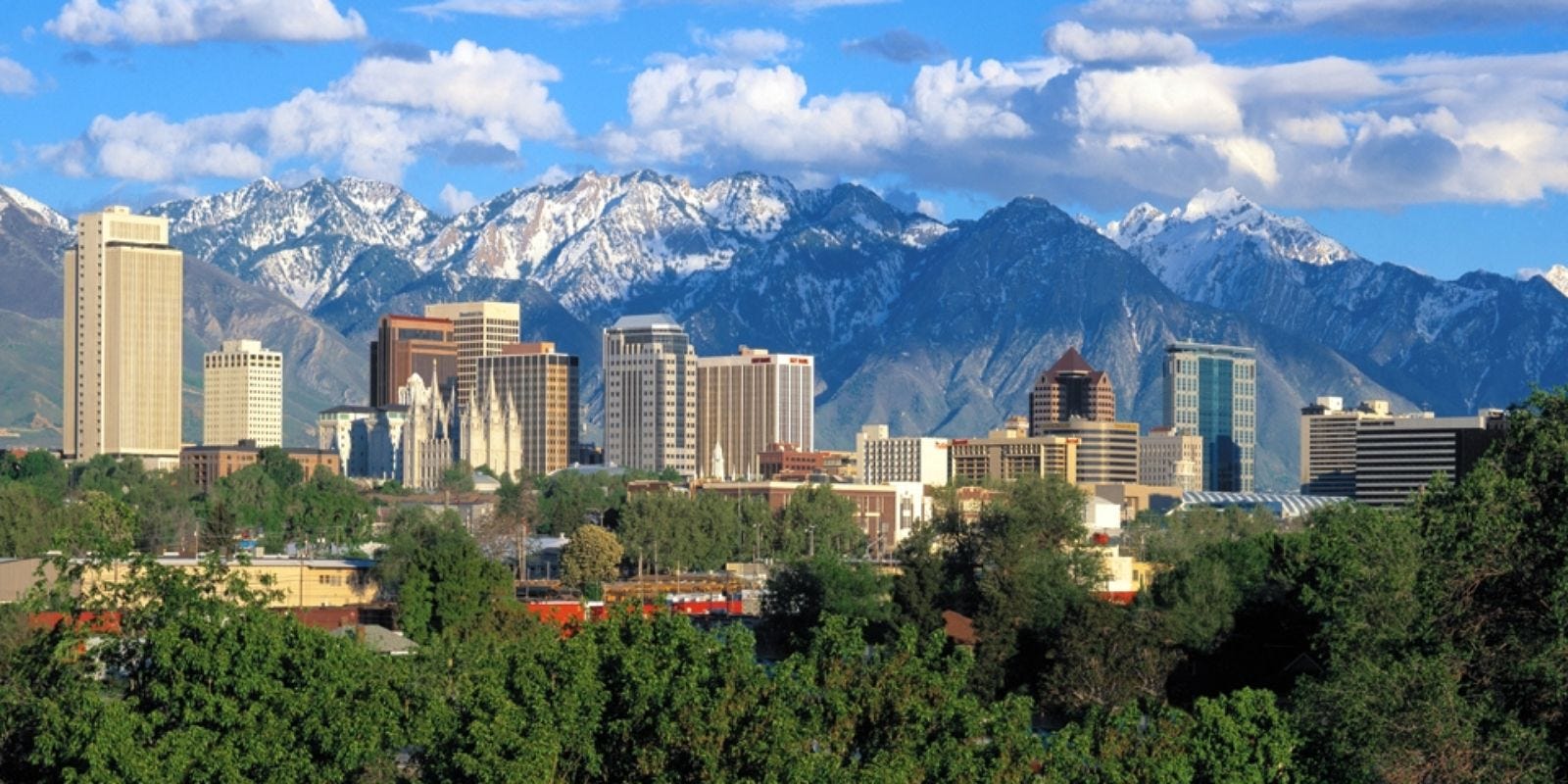
UN World Press Freedom Day: will violence against journalists affect PR practitioners too?
By James McQueeny and Barbara Burns
IPRA representatives to the United Nations’ Department of Public Information New York, USA.
More than a thousand journalists have been killed in pursuit of news around the world in the past 10 years, more than 30 alone in the first few months of 2018. The trend is worsening for journalists and it should be worrisome for public relations practitioners.
Speakers at the 2018 UN’s annual World Press Freedom Day conference noted that the nature of today’s conflicts are contributing to the casualty count. Increasingly, journalists are finding themselves in conflicts that have no front lines, or they are treacherously arbitrary, and shifting within hours, thus giving them scant comfort about protecting themselves.
In addition, for today’s video journalists, their cameras and team require closeness to chronicle events, contributing to the casualty counts. Newsgathering technology is a lot different from when young correspondent Winston Churchill wrote his Boer War dispatches from the dark panelled library of the Lord Nelson Hotel in Cape Town.
An ominous trend
UN Secretary General Antonio Gutierrez, and some other speakers, noted a more disturbing and ominous trend: journalists are being killed far away from any battlefield. More reporters are being hurt, kidnapped or killed in the middle of big cities around the world. Indeed assassination is not an inaccurate characterization.
Guterres’ video remarks at the conference brought this development closer to home for public relations practitioners. Both they and reporters alike must often convey information that can be unpopular.
This trend of silencing journalists by violent means could easily put public relations practitioners next in line. PR professionals are frequently hired and consulted to craft defensive public arguments against government intervention, from regulatory to investigatory.
Guterres said there are not enough laws to protect the communication of unpopular or unwanted information in societies, subjective or objective, though it is an essential element in open societies. While Guterres referenced the need for more laws to protect journalists, he said, by extension, they are also needed for anyone in the communications business using their freedom of expression and the right to information.
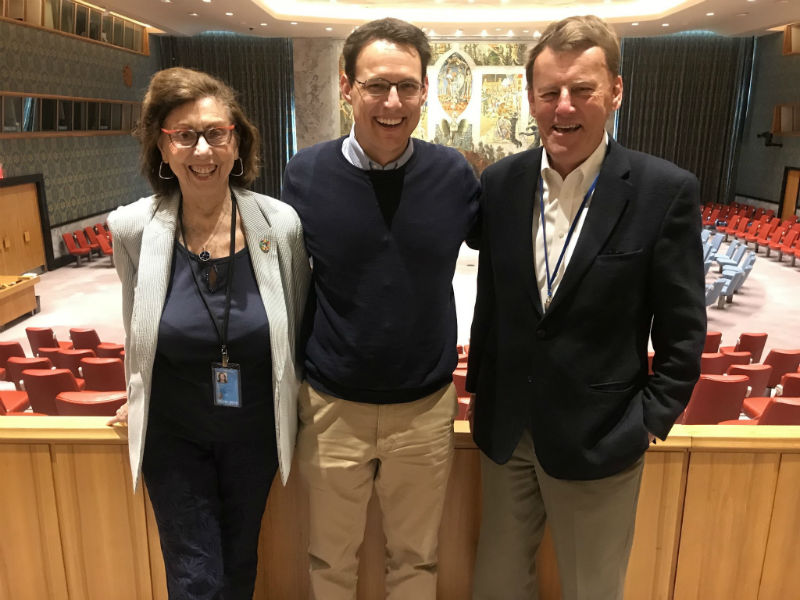
Barbara Burns Steve Kornacki and James McQueeny
The IPRA team at the conference also included a guest observer, U.S. national show host Steve Kornacki of channel MSNBC, and IPRA’s designated UN Youth representatives Maeve McQueeny and Matt Cossel. Speakers included: LeMonde correspondent Marie Bourreau; Elisabeth Cantenys executive director A Culture of Safety Alliance; and Syrian activist and Reuters photojournalist Loubna Mrie.
How does the IPRA UN relationship work?
IPRA representatives in New York work directly with the UN DPI and ECOSOC in New York. The IPRA Secretariat works with UNESCO in Paris. The relationship has three main components:
In common with other NGOs IPRA assists UN outreach at the international, regional, and national levels, especially to disseminate information about the UN’s Sustainable Development Goals
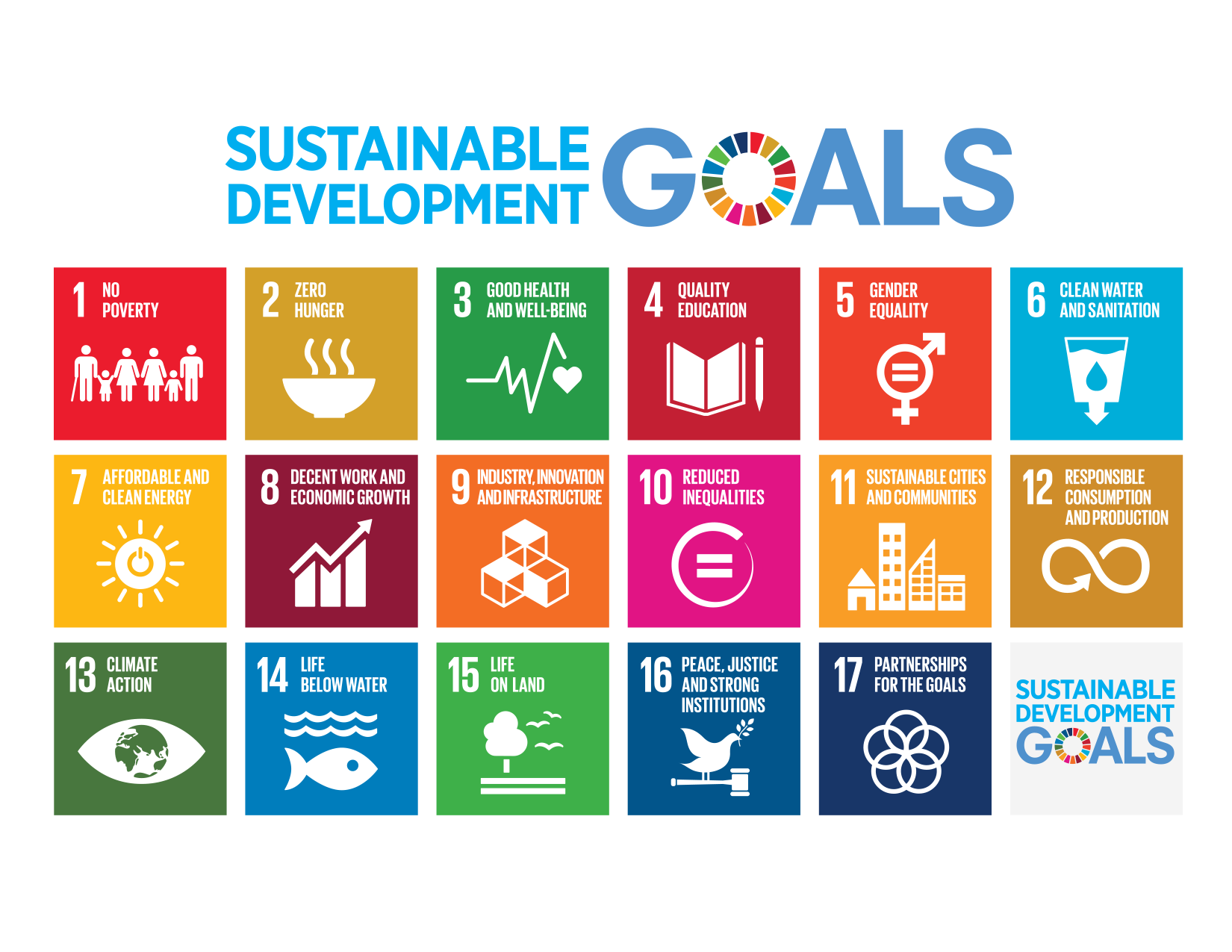

IPRA acts as a conduit of UN information to its membership.
IPRA is an advisory body on communication to help the UN itself communicate:
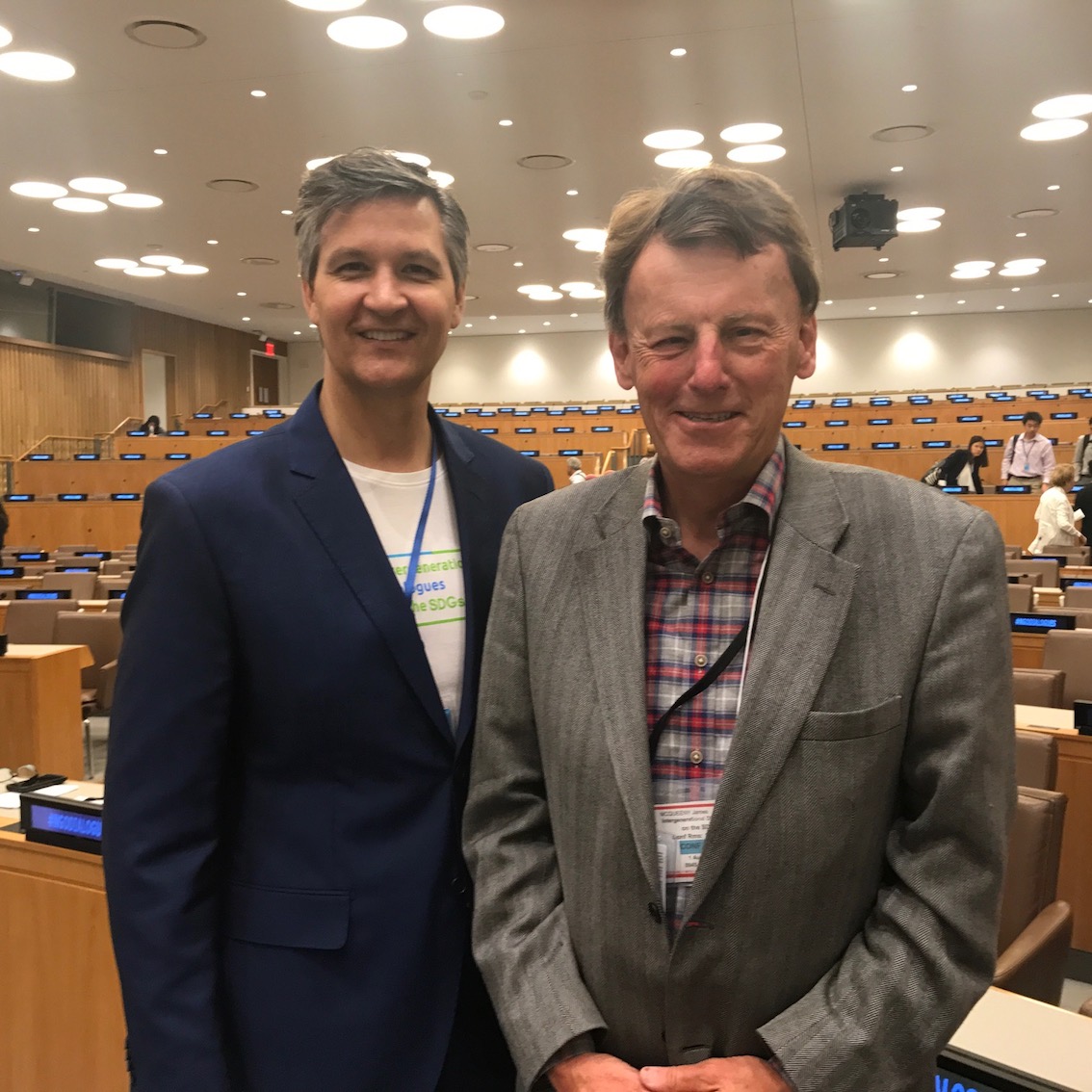
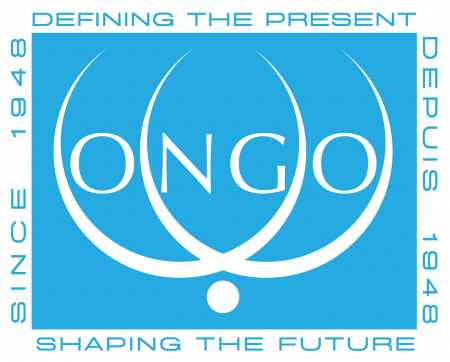
IPRA is a member of The Conference of Non-Governmental Organizations in Consultative Relationship with the United Nations (CoNGO). The conference’s vision is “to be the primary support and platform for a civil society represented by a global community of informed, empowered and committed NGOs that fully participate with the UN in decision-making and programs.”
IPRA at the 73rd session of the UN General Assembly
IPRA's representatives Jim McQueeny, Barbara Burns and youth representative Matthew Cossel attended an NGO briefing with the President of the 73rd session of the United Nations General Assembly, H.E. María Fernanda Espinosa Garcés in September 2018. Garcés has more than 20 years of multinational experience, holding various positions for her native Ecuador both domestically and abroad. She is only the fourth woman to hold the position, the first since 2006, and the first from Latin America. In addition to a focus on revitalization of the UN, priorities of her administration include decent work conditions, persons with disabilities, environmental action, migration and refugees, youth, peace and security, and gender equality.
The briefing provided an in-depth conversation between the NGO community and the President regarding the 73rd session of the General Assembly and the inclusion of civil society in its work. For more information follow this link https://www.un.org/pga/73/.
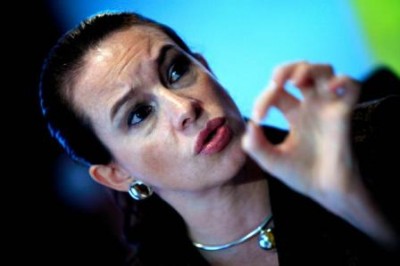
H.E. María Fernanda Espinosa Garcés
Zero Hunger Challenge
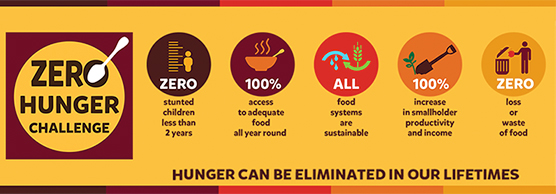
The IPRA Board resolved at its January 2015 meeting to support the The Zero Hunger Challenge.
The Challenge - Hunger can be eliminated in our lifetimes
This requires comprehensive efforts to ensure that every man, woman and child enjoy their Right to Adequate Food; women are empowered; priority is given to family farming; and food systems everywhere are sustainable and resilient. Launched by UN Secretary-General Ban Ki-moon in 2012, the Zero Hunger Challenge is his personal vision of a world without hunger – a global call to action.
The challenge of Zero Hunger means:

-
Zero stunted children less than 2 years

-
100% access to adequate food all year round

-
All food systems are sustainable

-
100% increase in smallholder productivity and income

-
Zero loss or waste of food

GWA and the UN
The annual IPRA Golden World Awards (GWA) initiative, established in 1990, recognizes excellence in public relations practice worldwide in a variety of categories. Recipients of the award take particular pride in the recognition granted to their entry as meeting international standards of excellence. An overall IPRA Grand Prix for Excellence is presented each year. While there are many national and regional PR awards, there is only one truly global scheme: the GWA.
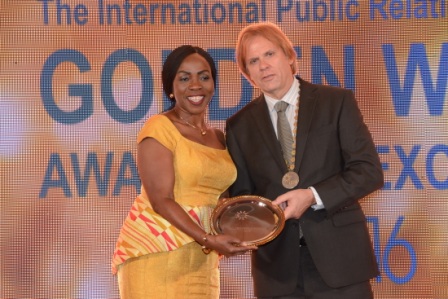
IPRA Global Contribution Award
The United Nations Award for outstanding achievement in PR was established in 1990 by the UN DPI in order to recognize programmes that address UN priority issues. Since 2017 this been called the IPRA Global Contribution Award and is given for PR programmes that support one of the UN Sustainable Development Goals.

The Golden World Awards and the IPRA Global Contribution Award generate sustained worldwide publicity over the year from
Recent Winners
2024
Recklessness Is the First Spark, Croatia
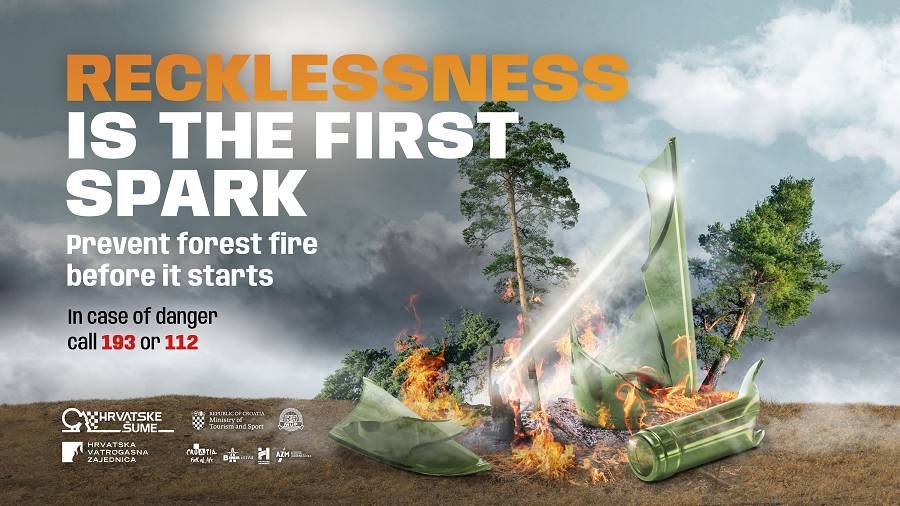
2023
Buzzing in the Museum, Pressinform, Hungary
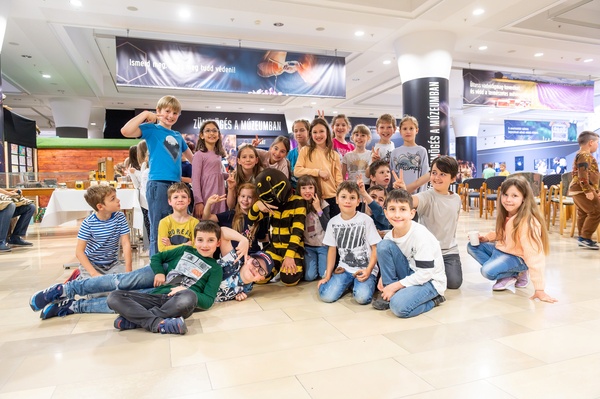
2022
Energy Wings, DTEK, Ukraine

2021
BASF Start Up Science, Press Office, Serbia
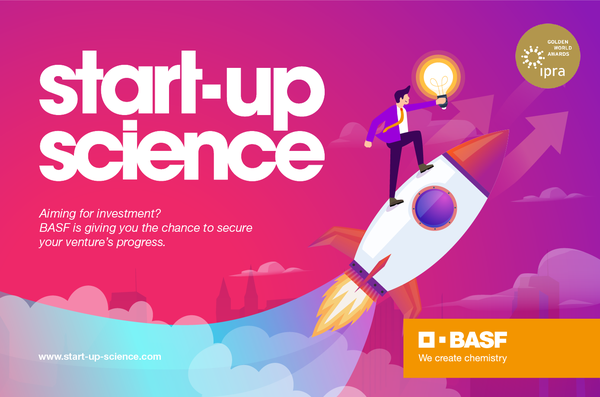
2020
Soaps with Dots, Apriori, Croatia

2019
No Barriers Tango, Turkcell, Turkey

2018
Saving Lives in Anguilla, Aequitas, UK
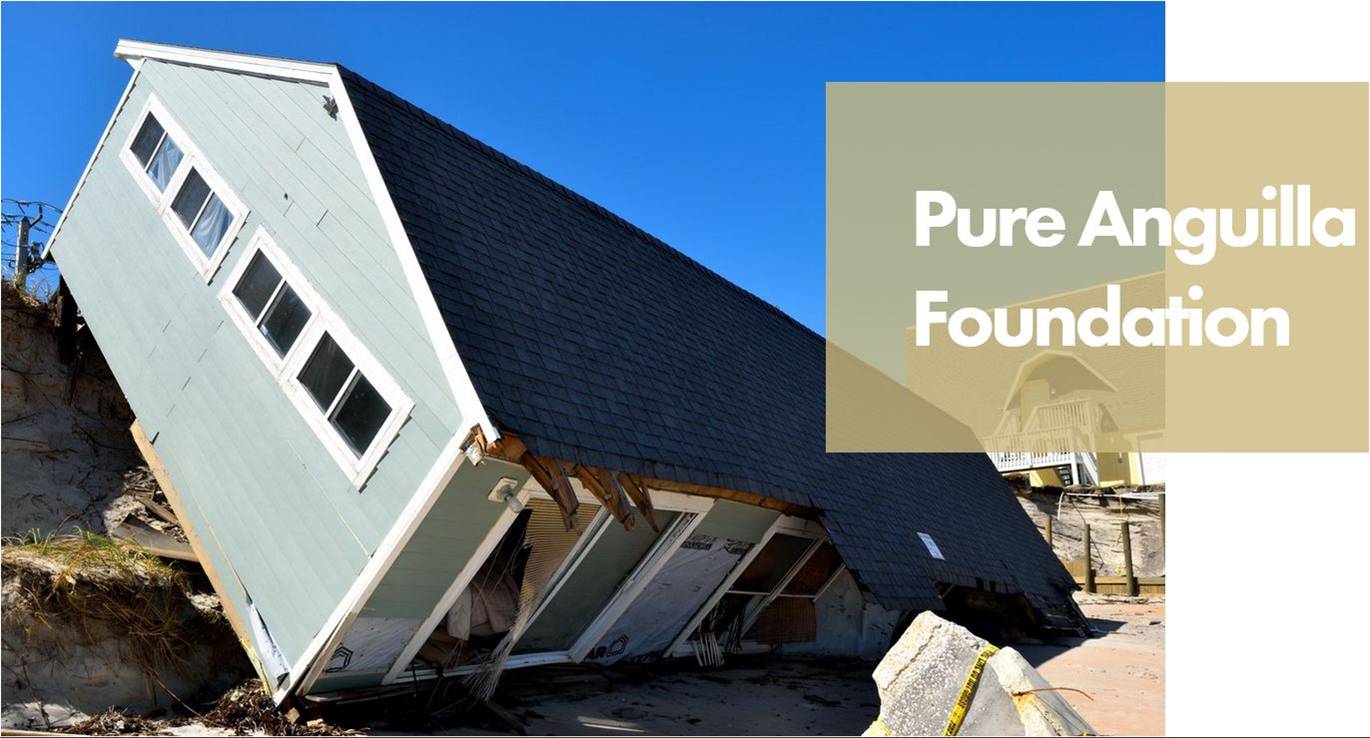
2017
Student Movement Against Childhood Diseases, Mediators, Pakistan
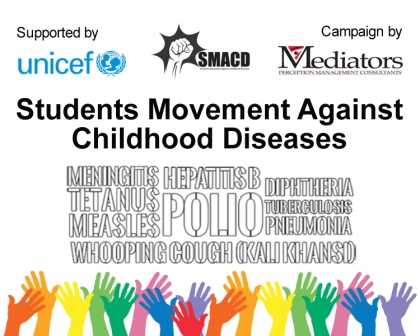
2016
Colour Me W, Strategic Communications, Ghana
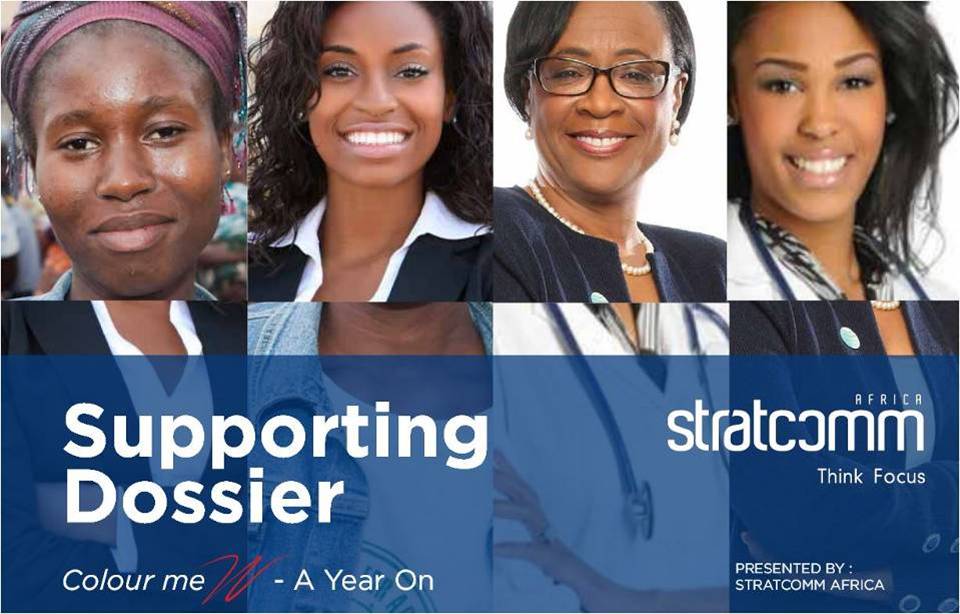
2015
Tackling Homophobia in Sport, Sydney Convicts Rugby Union Club, Australia
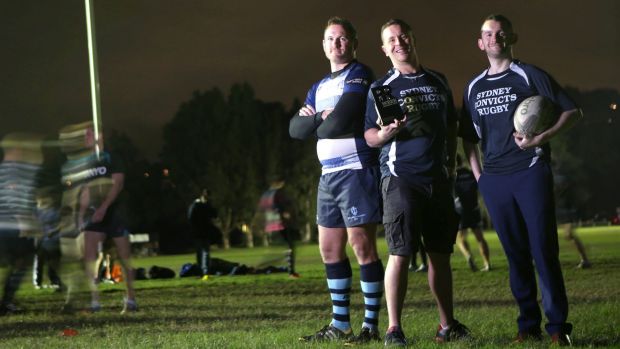
2014
Hobby Clubs, Garanti Pension and Life, Turkey

2013
Communicating to All, University of the Free State, South Africa

2012
Money-Box for Van, Turkcell, Turkey
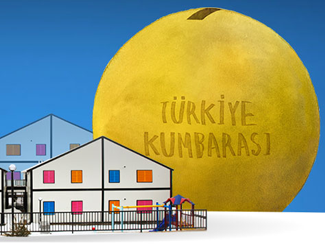
2011
Vac From the Sea, General Electric, USA

IPRA supports the UN comms executive committee
